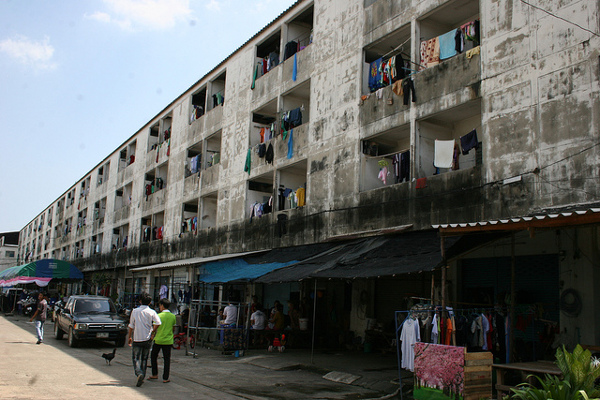- Details

Workers' accommodation in Samut Sakhon, Thailand. Photo: Finnwatch
Thai factories in international spotlight that produce tuna for the European markets have improved working conditions, according to the new follow-up report published by Finnwatch. Report is part of the Supply Change -project.
The passports of migrant workers are no longer confiscated and they have written employment contracts; work safety has increased and social security improved. But there are still problems: patterns of work place discrimination are reported and some of the migrant workers say that they have to pay high recruitment fees. To overcome the remaining problems cooperation is needed between the factories, retailers that purchase produce from them, and organisations that genuinely represent the migrant workers.
– Migrant workers still find it difficult to get their voices heard. The complaint mechanisms and workers committees at the factories are not functioning as they should. Workers still cannot negotiate working conditions with their employer, said Sonja Vartiala, Executive Director at Finnwatch.
The most significant shortcoming that was found during the follow-up research concerns recruitment fees for migrant workers who enter Thailand from Myanmar through the official MoU-process. These workers have to pay hundreds of euros in various fees in order to take up employment at the Unicord-factories which are part of the Sea Value Group.
– The leading tuna factories and the tuna industry in Thailand must ban the collection of recruitment fees from migrant workers. European buyers must also include such a ban to their social responsibility requirements, says Vartiala.
The European Union has taken steps to prevent illegal, unreported and unregulated fishing in Thailand. The problem is closely linked to the working conditions at fishing boats where there has been incidents of forced labour and trafficking in persons. Today's report notes that the monitoring of the supply chain of the factories is still in its infancy.
– The factories look to the Thai government to introduce changes to the legislation or are just about to start their own monitoring, says Vartiala.
The factories included into the report Thai Union Manufacturing and Unicord are part of Thai Union Group and the Sea Value Group and produce private label products for the supermarkets in Belgium, the UK, Lithuania, Estonia, Latvia, Finland, and Slovenia. The report encourages the European buyers to work more closely together to ensure better working conditions.
– Through audits alone it is difficult to achieve the necessary changes. Finding solutions to the remaining problems regarding discrimination, recruitment, and workers weak bargaining power requires genuine cooperation and dialogue between the industry representatives, buyers, and local workers organisations.
Download the report here >>
More information:
Sonja Vartiala
Finnwatch
+358-445687465
sonja.vartiala (a) finnwatch.org
@Finnwatch1
www.finnwatch.org
Supply Change is a campaign for fair supermarkets. We are 24 European civil society organisations, and we are calling on supermarkets, national governments and the European Union to take concrete action to ensure better working conditions in global south and reduced environmental impacts along the supply chains of supermarket's private label products.

This document has been produced with the financial assistance of the European Union. The contents of this document are the sole responsibility of Finnwatch and can under no circumstances be regarded as reflecting the position of the European Union.

Tämä teos, jonka tekijä on Finnwatch, on lisensoitu Creative Commons Nimeä-EiKaupallinen-EiMuutoksia 4.0 Kansainvälinen -lisenssillä.






